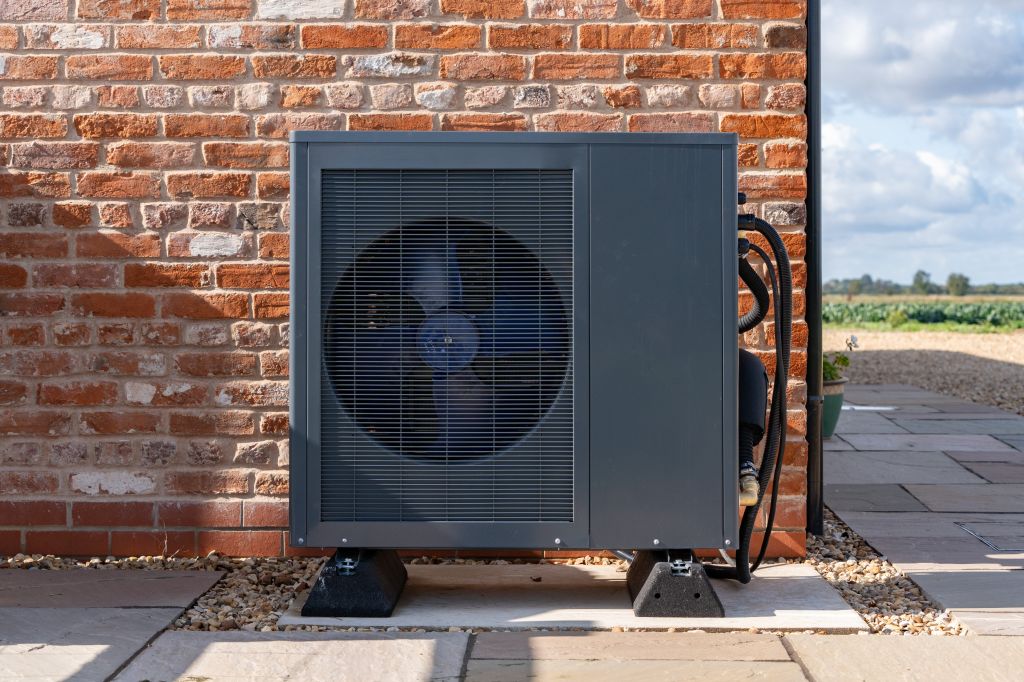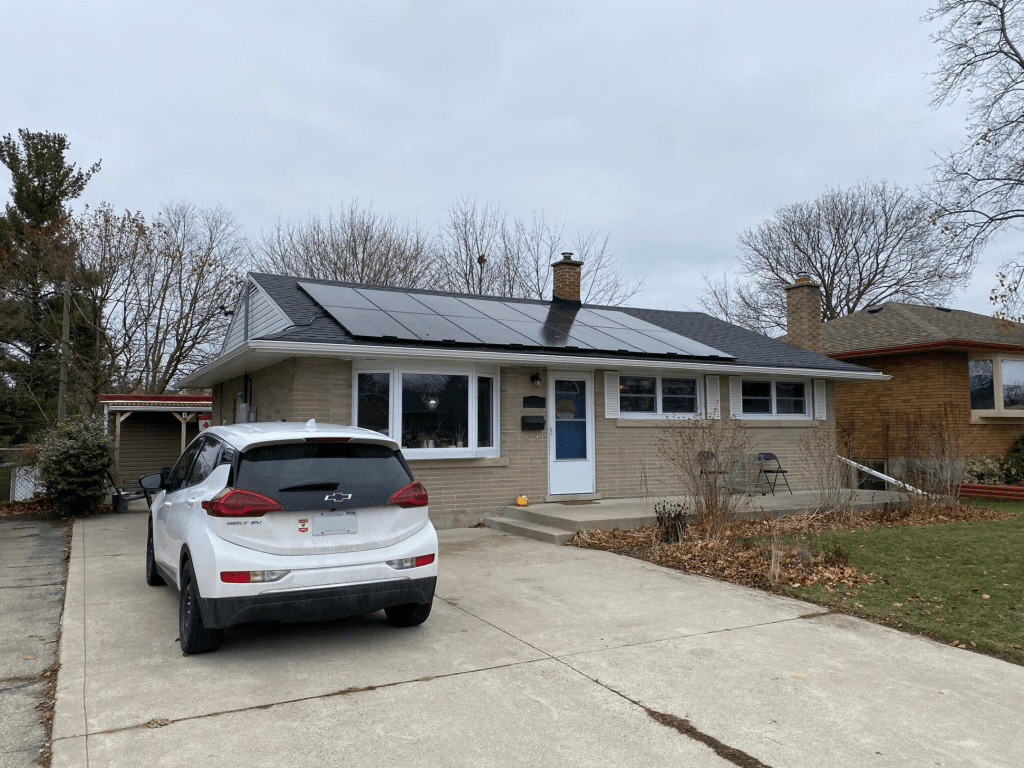Published May 30, 2024 • 8 Min Read
Whether you’re in the market for a new heating system, building a new home or looking to make your current home more energy-efficient, you may be weighing the benefits of installing a heat pump or a furnace. This article can help you evaluate the features, advantages and opportunities offered by both.
Why consider installing a heat pump in your home?
Both a heat pump and a furnace will effectively heat your home, but they go about it in different ways. Furnaces burn oil or gas in order to generate heat, while heat pumps run on electricity, sourcing energy from the outside air to heat your home. Heat pumps also cool your home, replacing the need for a separate air conditioning system.
While furnaces have historically had the market cornered on heating systems in Canada, heat pumps are becoming increasingly popular given their lower energy costs, improved energy efficiency and reduced environmental impact. In fact, the Environmental Protection Agency has recently discontinued their ENERGY STAR “Most Efficient” recognition of products that use gas, including furnaces. Over the last 20 years, the number of Canadians choosing heat pumps has grown to more than 850,000 — and that number is expected to continue rising.
So, is a heat pump better than a furnace? The answer is not a simple yes or no – there are many variables in play, including where you live, the type of house you’re heating and the cost of gas versus electricity. Here are five key factors to consider when deciding on the best way to heat your home.
1) How does the performance of a heat pump compare to a furnace?
While furnaces generate heat, heat pumps transfer heat from one place to another. They provide warmth in the winter by drawing heat from the outside air and pumping it into indoor spaces. Even when the temperatures outside are below freezing, there is a significant amount of thermal energy outdoors, which can be extracted and used inside. This means that in most climates, a regular heat pump will perform just as well as a furnace, reliably heating — and cooling — your home.
In fact, depending on the type of home and your regional climate, heat pumps can perform at 2-5x efficiency compared to a gas furnace.
In cold climates, furnaces are known to produce reliable and substantial heat, quickly increasing the inside temperature even during the most frigid months of the year. While one of the biggest concerns that consumers have had about heat pumps is their performance in cold temperatures, cold climate heat pumps have come to market in recent years to address this. Thanks to advances in technology, cold climate heat pumps are highly efficient and can provide reliable heating in extreme cold, including temperatures as low as -30° Celcius, without the need for a backup system.
2) How much does a heat pump cost to install compared to a furnace?
While heat pump adoption has increased in recent years across Canada, it is still lagging behind what is necessary to meet Canada’s emissions targets. One of the barriers restricting uptake is upfront cost to install, which tends to be higher than a traditional gas-powered furnace.
When it comes to initial cost outlay, however, there are a few things to keep in mind, including the type of heat pump, its expanded functionality, government incentives available, and the ongoing cost of a heat pump over its lifetime (which will be covered in the next section).
The different types of heat pump
There is a fairly wide range when it comes to the cost of heat pumps on the market today. For instance, larger systems designed to cool big homes in the coldest climates will cost more than smaller pumps that don’t need to work as hard.
-
Standard air-source pumps are the most popular. They work by sourcing heat from the outside air in winter, amplifying it, and providing heating inside. In the summer, they cool a house by moving heat from the inside to the outdoors.
-
Cost: about $9,000
-
-
Ground-source heat pumps move energy between the ground and the home to provide heating or cooling depending on the time of year. They are highly efficient and able to perform well in extreme temperatures.
-
Cost: $15,000 – $30,000
-
-
Cold climate heat pumps are specially adapted to cold Canadian climates and can effectively heat a home even when outdoor temperatures dip to -30° Celcius.
-
Cost: $10,000 – $19,000
-
By comparison, the average cost of a new natural gas furnace in Canada is between $4,000 and $6,500, including installation.
Other things to keep in mind:
-
Dual functionality. A major advantage of heat pumps is the fact they can both heat and cool your home, so you don’t need separate furnace and air conditioner units. By simplifying your home’s HVAC system, you could save money on the equipment and the installation.
-
The complexity of the installation. Is there a gas line already running to the house? If you’re retrofitting a home, is there existing ductwork that can simplify installation? Do you have a working air conditioner? These factors will affect your installation costs.
-
Rebates and incentives. There are a number of government programs designed to help homeowners looking to install a heat pump and/or convert to electric heating:
-
Oil to Heat Pump Affordability Program. Under the Canada Greener Homes Initiative, this program provides money to help homeowners install a new heat pump.
-
The Canada Greener Homes Loan. Offers interest-free financing for an energy-efficient home retrofit.
-
The Province of Ontario supports several heat pump rebate programs and CleanBC, BC Hydro and FortisBC offer BC homeowners rebates of up to $6,000 for the purchase and installation of an eligible heat pump, depending on how you currently heat your home. Check for rebates in your province or territory to find out how you can save on your heat pump installation.
-
3) Does a heat pump cost less than a furnace to run?
While the upfront installation costs of a heat pump may be more, over time, heat pumps are the lowest-cost option for most households. Given their high energy efficiency they cost less to run, therefore lowering your energy bills.
The Canadian Climate Institute developed a Heat Pump Calculator, which helps you compare the cost of heat pumps to other home heating and cooling options in five cities across Canada.
Keep in mind, while heat pumps are more energy-efficient than traditional heating and cooling systems, they still require electricity to operate. Consider the cost of electricity versus gas in your area to determine how the operating costs of these systems might stack up.
4) Will a heat pump last longer than a furnace?
Heat pumps are known for their durability. With fewer mechanical components than furnace/ air conditioning systems, they typically require less maintenance. Having said that, regular maintenance can extend the lifespan of your heat pump – well-maintained equipment will have a lifespan upwards of 15 years.
5) Is a heat pump better for the environment?
Space heating accounts for up to 63.6% of the energy used in the average Canadian household, and 99% of home emissions in Canada are from heating systems. Currently, the burning of fossil fuels for space and water heating in homes and buildings accounts for 10 per cent of Canada’s total emissions.
With a furnace, energy comes from burning fossil fuels, such as natural gas, oil and propane – a process that emits greenhouse gasses. Keeping in mind that fossil fuels will always be high-emitting energy sources — and electricity continues to become cleaner in most regions — switching from burning fossil fuels to electricity-powered heat pumps can make an immediate difference to emissions levels. This is particularly true in provinces where electricity is generated by renewable and non-emitting sources. Even when powered by electricity with relatively higher emissions, heat pumps emit between 20 and 30 per cent less carbon emissions than gas furnaces due to their high efficiency.
Heat pump of furnace: Which is right for your home?
The bottom line is, there are many variables when it comes to the actual impact of a heat pump in your home, including geography, your house type, the cost of gas versus electricity and more. Generally, however, heat pumps are a clear winner for moderate climates with their ability to efficiently and cost-effectively heat and cool a home. In colder climates, the upfront cost to install a cold climate heat pump may be higher, but advancements in technology mean that it could be just as effective as a furnace to heat your home — new cold climate heat pumps are highly efficient and reduce the need for a back-up system, making it easier for homeowners to reduce their environmental impact while enjoying better cost-efficiency over time.
This article is intended as general information only and is not to be relied upon as constituting legal, financial or other professional advice. A professional advisor should be consulted regarding your specific situation. Information presented is believed to be factual and up-to-date but we do not guarantee its accuracy and it should not be regarded as a complete analysis of the subjects discussed. All expressions of opinion reflect the judgment of the authors as of the date of publication and are subject to change. No endorsement of any third parties or their advice, opinions, information, products or services is expressly given or implied by Royal Bank of Canada or any of its affiliates.
Share This Article






